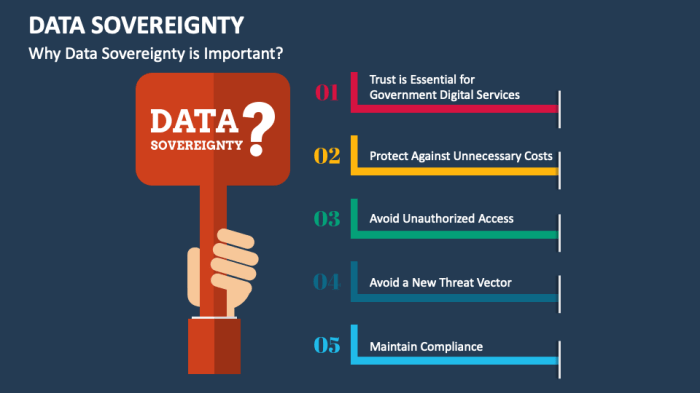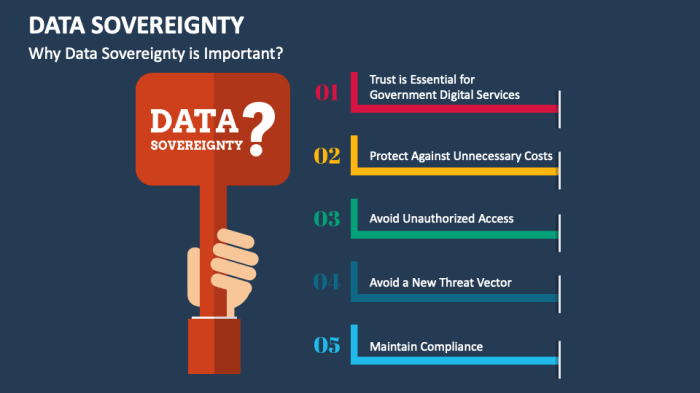Regionalised data sovereignty changing marketing – Regionalised data sovereignty is changing marketing, forcing businesses to rethink their data collection, storage, and usage practices. This shift, driven by increasing privacy concerns and national security interests, presents both challenges and opportunities for marketers.
From the European Union’s General Data Protection Regulation (GDPR) to China’s Cybersecurity Law, countries are implementing data sovereignty regulations that restrict the flow of personal data across borders. These laws require companies to store and process data within specific geographic regions, impacting how businesses can target customers, personalize experiences, and build brand loyalty.
The Rise of Regionalised Data Sovereignty: Regionalised Data Sovereignty Changing Marketing
The world of data is becoming increasingly complex, with new regulations and laws emerging to protect the privacy and security of individuals’ information. One of the most significant trends in this area is the rise of regionalised data sovereignty. This concept refers to the laws and regulations that govern the collection, storage, processing, and transfer of personal data within specific geographical regions.
It’s essentially about giving countries more control over the data of their citizens.
Data Sovereignty Laws and Their Impact on Businesses
Data sovereignty laws are having a profound impact on businesses, particularly those operating in a globalized marketplace. They impose various obligations and restrictions on how companies can handle data, which can significantly affect their operations and strategies. For example, companies might need to establish data centers in specific regions, implement data encryption protocols, or obtain user consent for data processing.
Drivers of Data Sovereignty
Several key drivers are contributing to the increasing adoption of data sovereignty laws around the world.
- Privacy Concerns:Data breaches and privacy scandals have heightened public awareness of the importance of data protection. Governments are responding by enacting stricter regulations to safeguard their citizens’ personal information.
- National Security:Data sovereignty is often seen as a crucial element of national security. Governments want to ensure that sensitive data, particularly those related to national defense or critical infrastructure, is not stored or processed outside their borders.
- Economic Growth:Many countries view data sovereignty as a key driver of economic growth. By promoting the development of local data infrastructure and fostering data-driven innovation, they hope to attract investment and create new jobs.
Examples of Data Sovereignty Regulations
Here are some examples of data sovereignty regulations from different regions:
- The European Union’s General Data Protection Regulation (GDPR):This landmark legislation, effective since 2018, grants individuals greater control over their personal data and imposes strict requirements on organizations that process it. One of the key principles of the GDPR is data localization, which requires organizations to store and process the personal data of EU residents within the EU.
- The California Consumer Privacy Act (CCPA):The CCPA, enacted in 2018, provides California residents with the right to know what personal data is collected about them, the right to delete their data, and the right to opt-out of the sale of their data. While it doesn’t explicitly require data localization, it does restrict the transfer of personal data to certain countries outside the US.
- China’s Cybersecurity Law:This law, which came into effect in 2017, requires organizations that handle personal data of Chinese citizens to store that data within China. It also imposes restrictions on the transfer of data outside the country, requiring companies to obtain government approval for such transfers.
Impact on Marketing Strategies
Regionalised data sovereignty presents both challenges and opportunities for marketers. Understanding how these laws affect data collection, storage, and processing practices is crucial for navigating this evolving landscape.
Data Collection, Storage, and Processing
Data sovereignty laws impact how marketers collect, store, and process customer data. These laws dictate where data can be collected, stored, and processed, and often require companies to obtain explicit consent from individuals before collecting and using their data.
- Data Collection:Marketers must ensure they comply with local data privacy regulations when collecting data from individuals within a specific region. This includes obtaining informed consent, providing clear data collection policies, and limiting the collection of sensitive personal data. For example, the European Union’s General Data Protection Regulation (GDPR) requires companies to obtain explicit consent from individuals before collecting and using their personal data.
This means that marketers need to be transparent about how they will use the data they collect and give individuals the right to opt out of data collection.
- Data Storage:Data localization requirements may mandate that certain types of data be stored within the geographical boundaries of a specific region. This can impact where marketers choose to store their data, as they may need to establish data centers or partner with local cloud providers to comply with these regulations.
For instance, China’s Cybersecurity Law requires companies to store personal data of Chinese citizens within the country. This means that marketers who target Chinese consumers may need to store their data in Chinese data centers.
- Data Processing:Data sovereignty laws can also affect how marketers process customer data. Some regions may have restrictions on how data can be used for analysis, targeting, and other marketing activities. This can impact the effectiveness of marketing campaigns, as marketers may need to adjust their strategies to comply with these regulations.
For example, the California Consumer Privacy Act (CCPA) gives consumers the right to access, delete, and opt out of the sale of their personal data. This means that marketers need to be careful about how they use customer data for targeting and personalization, as they may need to obtain explicit consent from individuals before using their data for these purposes.
Implications for Targeted Advertising and Customer Segmentation
Data localization requirements can impact the effectiveness of targeted advertising and customer segmentation.
- Targeted Advertising:Marketers may face challenges in using data for targeted advertising due to restrictions on data sharing and transfer across borders. This could limit the ability to create personalized ad campaigns based on detailed customer profiles. For example, if a marketer is based in the United States and wants to target consumers in the European Union, they may need to obtain consent from individuals before using their data for targeted advertising.
This can make it more difficult to create highly personalized ad campaigns, as marketers may have less access to data about individual consumers.
- Customer Segmentation:Data localization requirements can also affect customer segmentation strategies. Marketers may need to rely on less granular data to segment customers, as they may not be able to access all of the data they need to create detailed customer profiles.
For example, if a marketer is based in the United States and wants to segment customers in the European Union, they may need to rely on data that is publicly available or that has been aggregated at a higher level.
This can make it more difficult to create targeted marketing campaigns, as marketers may have less information about the specific needs and preferences of individual customers.
Adapting Marketing Strategies

The rise of regionalised data sovereignty presents a significant challenge for marketers, requiring them to adapt their strategies to comply with diverse regulations and maintain customer trust. This involves understanding the specific data protection laws in each region, designing campaigns that respect data privacy, and building strategies that leverage data localization to enhance customer relationships.
Designing a Marketing Strategy that Complies with Regionalised Data Sovereignty Regulations
Developing a compliant marketing strategy involves understanding the specific data protection laws in each region and designing campaigns that respect data privacy. Here are some key considerations:
- Identify relevant data protection laws: Businesses need to understand the data protection laws that apply to their target audience. For example, the European Union’s General Data Protection Regulation (GDPR) and the California Consumer Privacy Act (CCPA) are key regulations that businesses must comply with.
Obtain a comprehensive document about the application of carbon offset data startup treefera raises e2m to map forests with ai that is effective.
- Obtain informed consent: Businesses must obtain explicit consent from individuals before collecting, using, or sharing their personal data. Consent must be freely given, specific, informed, and unambiguous.
- Implement data minimization: Businesses should only collect and process the data necessary for their specific purposes. This reduces the risk of data breaches and minimizes the potential for harm to individuals.
- Ensure data security: Businesses must implement robust security measures to protect personal data from unauthorized access, use, disclosure, alteration, or destruction. This includes encryption, access controls, and regular security audits.
- Respect data subject rights: Individuals have the right to access, rectify, erase, restrict, and object to the processing of their personal data. Businesses must provide mechanisms for individuals to exercise these rights.
Sharing Best Practices for Managing Data Consent and Privacy in a Multi-Jurisdictional Environment
Managing data consent and privacy in a multi-jurisdictional environment requires a robust framework that ensures compliance with diverse regulations. Here are some best practices:
- Centralized consent management: Implementing a centralized consent management system allows businesses to track and manage data consent across different regions. This helps ensure that consent is obtained in accordance with local regulations.
- Data mapping: Creating a comprehensive data map helps businesses understand where data is stored, how it is used, and who has access to it. This enables businesses to identify potential risks and develop mitigation strategies.
- Data governance framework: Implementing a data governance framework helps businesses establish clear policies and procedures for data collection, use, and sharing. This framework should be aligned with local regulations and best practices.
- Privacy by design: Integrating privacy considerations into the design and development of products and services ensures that data protection is built in from the start. This approach helps minimize the risk of data breaches and compliance issues.
- Regular audits and assessments: Regularly conducting data privacy audits and assessments helps businesses identify and address potential compliance gaps. This ensures that data protection measures remain effective and meet evolving regulatory requirements.
Leveraging Data Localization to Build Trust and Enhance Customer Relationships
Data localization, the practice of storing and processing data within a specific geographic region, can be leveraged to build trust and enhance customer relationships. Here’s how:
- Demonstrating commitment to privacy: By storing and processing data within a region, businesses demonstrate their commitment to respecting local data protection laws and the privacy of their customers. This can help build trust and enhance customer relationships.
- Improving customer experience: Data localization can improve customer experience by reducing latency and enhancing responsiveness. This is particularly important for services that rely on real-time data, such as online gaming or financial transactions.
- Building local partnerships: Data localization can create opportunities for businesses to partner with local technology providers and service providers. This can lead to new business opportunities and enhance the local ecosystem.
- Tailoring marketing campaigns: Data localization can enable businesses to tailor their marketing campaigns to specific regional audiences. This can improve campaign effectiveness and enhance customer engagement.
Technological Solutions
The rise of regionalised data sovereignty presents significant challenges for businesses seeking to engage with global audiences. However, the development of advanced technologies offers innovative solutions to navigate these complexities, enabling companies to comply with data regulations while maintaining their marketing effectiveness.
Data Masking
Data masking is a powerful technique that involves replacing sensitive information with non-sensitive substitutes, preserving the structure and format of the original data while safeguarding privacy. This approach ensures compliance with data sovereignty regulations by preventing the transfer of sensitive data across borders.
- For example, a company might mask customer names and addresses in marketing databases before transferring them to a data processing center in a different region. This allows for data analysis and campaign optimization without compromising customer privacy.
- By implementing data masking, businesses can leverage the benefits of cloud computing and global data processing while adhering to local data residency requirements.
Encryption
Encryption is a fundamental technology for protecting sensitive data during transmission and storage. It involves converting data into an unreadable format, rendering it inaccessible to unauthorized parties. Encryption is essential for complying with data sovereignty regulations, ensuring that data remains secure even when transferred across borders.
- For instance, a company might encrypt customer data before transmitting it to a marketing platform in a different country. This ensures that the data remains protected from unauthorized access during transit.
- By implementing strong encryption protocols, businesses can demonstrate their commitment to data security and gain the trust of customers and regulators alike.
Federated Learning
Federated learning is a groundbreaking technology that allows multiple devices or systems to collaboratively train a machine learning model without sharing their raw data. This approach enables businesses to develop personalized marketing strategies while respecting data sovereignty laws.
- For example, a company could use federated learning to train a model that predicts customer preferences based on data from users in different regions. The model would be trained on individual devices, without the need to transfer sensitive data to a central server.
- By adopting federated learning, businesses can leverage the power of machine learning to optimize their marketing campaigns while maintaining compliance with data sovereignty regulations.
Future Trends
The landscape of regionalised data sovereignty is constantly evolving, driven by technological advancements, changing societal expectations, and a growing awareness of the importance of data privacy. This evolution will continue to shape marketing strategies in significant ways, presenting both challenges and opportunities for businesses.
Evolving Regulatory Landscape
The regulatory landscape surrounding data sovereignty is becoming increasingly complex and dynamic. Existing regulations, such as the General Data Protection Regulation (GDPR) in Europe and the California Consumer Privacy Act (CCPA) in the United States, are being refined and expanded.
New regulations are also emerging in various regions, reflecting the growing global focus on data privacy. For instance, Brazil’s Lei Geral de Proteção de Dados (LGPD) and India’s Personal Data Protection Bill are examples of emerging frameworks that aim to protect individual data rights.
These evolving regulations will continue to influence how businesses collect, store, and use data, necessitating a proactive approach to compliance.
Emergence of New Data Protection Frameworks, Regionalised data sovereignty changing marketing
Beyond traditional regulatory frameworks, new approaches to data protection are emerging. These include:
- Data Trusts:These are legal entities that hold and manage data on behalf of individuals, ensuring its responsible use and providing individuals with greater control over their data.
- Decentralized Data Storage:Blockchain technology and other decentralized storage solutions offer alternative approaches to data management, allowing for more secure and distributed storage of sensitive information.
- Data Minimalism:This approach emphasizes collecting and using only the data that is absolutely necessary for a specific purpose, reducing the risk of data breaches and enhancing privacy.
These emerging frameworks will likely play a significant role in shaping the future of data sovereignty, requiring businesses to adapt their data management practices accordingly.
Challenges and Opportunities for Businesses
The evolving trends in regionalised data sovereignty present both challenges and opportunities for businesses.
- Compliance Complexity:Navigating the increasingly complex regulatory landscape can be a significant challenge, requiring businesses to invest in resources and expertise to ensure compliance with evolving data protection laws.
- Data Localization Requirements:Businesses may need to adjust their data storage and processing practices to comply with data localization requirements, potentially impacting data accessibility and operational efficiency.
- Increased Transparency and Accountability:Businesses will need to be more transparent about their data collection and usage practices, demonstrating accountability and respect for individual data rights.
- Opportunities for Innovation:The focus on data privacy can also drive innovation, encouraging businesses to develop new technologies and strategies that prioritize user privacy while delivering valuable services.
- Competitive Advantage:Businesses that embrace data sovereignty principles and demonstrate a commitment to responsible data management can gain a competitive advantage by building trust with customers and enhancing their brand reputation.





